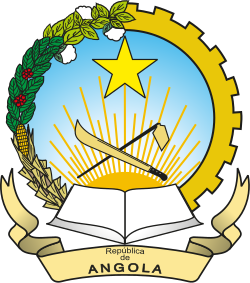| Vice President of the Republic of Angola | |
|---|---|
 | |
| Term length | 5 years, renewable once |
| Inaugural holder | Fernando da Piedade Dias dos Santos |
| Formation | 18 February 2010 |
| Salary | 843,371.06 Kwanzas annually [1] |
 |
|---|
The vice president of Angola is the second highest political position in Angola; it is appointed by and is the deputy to the president. The position was established by the constitution of 2010. [2]





